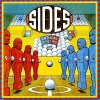"The Story Of Sides" - With the album celebrating its 30th
anniversary this year, I thought it was about time to tell the story of this
Anthony Phillips classic album. Article by Alan Hewitt. Memorabilia courtesy
of Jonathan Dann.
Time really does fly doesn't it?! It really is difficult to credit that Sides
has been spinning round on either my turntable or CD player for that length
of time but it's true and so I thought it might be useful to revisit the story
of the album. By the end of 1978 Ant had released two solo albums to varying
degrees of success. The Geese & The Ghost had had the benefit of being a
"first album" and one which still had Genesis connections in the shape
of the presence of Phil and Mike on it. Wise After The Event, which followed
it barely a year later had seen Ant bravely stepping completely away from anything
to do with his former band mates and taking up the cudgels to sing his own vocals.
The resulting album had been well received by fans but indifferently by the
music press and had not achieved any real degree of commercial success despite
it being completely song-orientated. Sadly, Ant's song writing is as idiosyncratic
as his music and the chances of his songs achieving a "hit" in a music
scene dominated by the thrash anarchy of the so-called "New Wave"
movement which was the flavour of the month in the UK in 1978/79 were minimal
to say the least.
This, of course, left Anthony with a dilemma to resolve.
Did he continue along the path he had started on with his first two albums?
Did he return to the acoustic side of his music or did he leave the music
business behind him altogether? Thankfully for his fans, the latter course
was never really going to be an option. Like it or not, Anthony was and
IS a musician and he was determined to continue to sow his own musical
row and Sides was the next step in his musical journey.
Anthony's own leanings are very much removed from what is considered
to be "Commercial" however, and Sides was to be something of
a compromise between his own musical ideas and those of the record company
as he recalls... |
|
"The record company tended to be everything in those days. Very few
people had home studio set ups. You had to toe the line to get into the studio.
After Wise After The Event doing very little commercially there was pressure
to go one stage further away from The Geese And The Ghost and those kind of
instrumentals and try to create a more song-based album...."
Things were never quite that simple however, as Anthony continued to work on
instrumental pieces at the same time. The battle was on to try and find a happy
medium which could satisfy both sides of the coin. Fortunately for Ant, he had
in Rupert Hine, a producer sympathetic to his problems as Rupert himself remembers...
"There was feedback which said that Anthony was a good songwriter
and that if other people sang his material they felt it would be more accessible.
Ant has an idiosyncratic voice and if people want to hear technically good singers
then that brings in the idea of getting people like Dan Owen in; outside voices
to work on Anthony's music and that was one suggestion that Ant was keen to
try too - as I said, he was never confident about his vocal abilities anyway....I
don't think that Sides gained a lot more by the attempts at more commercial
song writing, outside singers and so on. It's still a good album but for me
there's an intensely Anthony Phillips quality that is 100% Ant- with Sides you
can hear these attempts to make the music perhaps slightly more widely appealing
for better or worse..."
The frustrations of trying to appease the commercial demands of the record
industry while trying to remain faithful to your own music identity certainly
rubbed off on Anthony and he let his frustrations show on one of the album's
tracks, the bitterly observant; Un & Aargh which was very much a dig at
the vagaries of the industry as Ant explains...
|
"Um & Aargh was very much a reaction to the frustration
after Wise After The Event - that album got slammed in the press. I just
didn't know where to turn. I had an inkling that I had come back in at the
worry time. When the market was turning against this sort of stuff. I remember
Tony Smith saying; 'don't worry, it'll all blow over' but nevertheless,
coming back into the scene and trying to make my name and being at the mercy
of the press was pretty tough actually. So when I came to write this new
album, there were aspects of it where I was deeply frustrated and didn't
realy know with the more rocky stuff, so I suppose doing a kind of angry
song was quite a good way. There have been all these great lines about various
A & R (Artist & Repertoire for those of you wondering what it means)
men from about a year or so prior to that when I met Mike Giles and John
Perry - there were some great quotes. With one of John's albums they said
it was 'too good to go out' (laughter) and there were all these cliches
about. It is a difficult job but you heard these stories about A & R
men who really didn't have a clue - they were very pretentious, very posey
kind of people, the track suited type that would wander into the studio,
walk in and say 'hi gang' and then wander out again. And they were the ones
supposed to be making all your artistic decisions!" |
So, on one side you had all those guys and on the other you had the press that
you knew were going to snipe at you. In a way I was having a go at the record
companies but I was also trying to come up with a piece of music that would
make the press think that I was on their side. Ironically it did succeed - the
press thought that I was with them on that one!"
Even the album's original title reflects something of the anger and frustration
that Ant felt at this time...
"The album was originally going to be called 'Balls' (laughter) that's
how far I was reacting. It was two fingers time and that was my version of two
fingers. There seemed no point in coming up with nice romantic stuff. Humour
can help you through difficult times and it was very depressing around the time
of Wise After The Event but 'Balls' was considered to be too eccentric and so
it had to be changed to 'Sides' but Peter Cross's initial idea was based on
'Balls' and what a fantastic idea that was as well; it was stunning..."
For an album that had to conform to the commercial demands
of the record company, Sides still managed to cram in a wide variety of
styles and influences. the Reggae shuffle of Holy Deadlock with its sardonic
lyric by Martin Hall, the out and out Progressive Rock of the album's
two instrumental workouts Nightmare and Sisters Of Remindum and the marvellous
ballads Magdalen and I Want Your Love, while Bleak House is the Dickens
novel in miniature.
Sadly though there were several items that were written and recorded
at the time but which due to restrictions on recording time and other
considerations were shelved at the time as both Ant and Rupert recall... |
|
(Ant) "There were two completely instrumental pieces; one twelve string
piece which could have been a sort of The Geese & The Ghost thing, and another
synth based piece which would have preceded Slow Dance by about ten years. Rupert
Hine was very keen to go with those, being a great instrumental composer himself.
He wasn't just a song man, so he appreciated that side of things as well. But
he could see how impractical it would be and he was also getting his instructions
from the record company. he liked both sorts of material and so he would have
gone with either type..."
(Rupert) " Strictly speaking as a music lover and somebody whose main
motivation is to help people make the very best albums that they can make and
the best album under the terms of what the person has to offer and not in terms
of commercial pressures and so on, then yes, the best album we could have made
with Anthony was always going to be the stuff that he does which no one else
does. Therefore, the intensely Anthony Phillips side of his writing would have
been much more logically the piano and twelve string pieces and the idiosyncratic
aspects of Sides - if we could have kept those then yes, I think I probably
would have done..."
|
The album was eventually released in the summer of 1979 in
the USA and subsequently in the UK where it was paired initially with a
limited edition of the first Private Parts & Pieces album. Sadly this
marketing ploy, delightful for the hard core Anthony Phillips fans, did
not ensure that the album had the more mainstream success that it undoubtedly
deserved. Thankfully once the CD format became viable in the mid 1980's
Ant's back catalogue has benefited not only from the improvements in sound
quality which that format has to offer but also the increased playing length
has also ensured that some of the previously unreleased material mentioned
in this feature has finally been brought to the audience it was originally
intended for. |
As for Anthony, well, the Private Parts & Pieces album mentioned above,
was to prove to be a mainstay of his musical career and the story of that album
and the series of subsequent ones under the same generic title is another story
for another edition of TWR, folks....
Quotations in this feature are taken from "Talking Sides" (#5 of
The Pavilion Magazine) and "The Humbert Ruse Interview (#6 of The Pavilion
Magazine)



